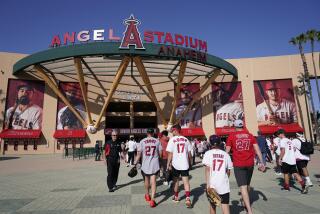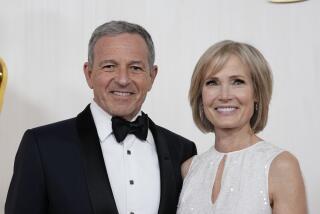To Many, the Rookie Made One Gutsy Play
- Share via
A week ago, Harry Sidhu was a little-known, first-term councilman in Anaheim. But since disrupting the city’s well-choreographed pitch to the National Football League, the self-proclaimed man of the people has become something of a celebrity.
Near the end of a City Hall news conference May 10, he warned taxpayers that 40 acres of valuable city-owned land was about to be handed over to the NFL free of charge. He suggested that the parcel, in the Angel Stadium parking lot, could be sold for up to $150 million and used to add about 50 police officers and beautify West Anaheim, a long-neglected area of the city.
Sidhu’s impassioned five-minute speech blindsided his council colleagues, amazed his supporters and turned him into the flavor of the week in Southern California sports talk-radio circles. Sidhu said he felt compelled to speak up after he and other council members were excluded from a discussion that included Anaheim Mayor Curt Pringle, City Manager Dave Morgan and two consulting teams.
“I wasn’t up there to make a name for myself,” said Sidhu, 48. “I was there to protect the taxpayers’ money. All of us on council all have equal votes. We should all have equal time to talk.”
At the end of his monologue and for the news media’s benefit, Sidhu spelled his name and blurted out his cellphone number.
Council members Lorri Galloway and Richard Chavez called the performance “grandstanding.”
“It was all about making himself self-important,” Galloway said. “He made it seem like he’s the only one who cares about our fiduciary duty to our city. I frankly resent it.”
Anaheim still appears to have the three votes necessary to approve any NFL deal, so Sidhu’s warning might be inconsequential, but it probably didn’t go without notice in Carson, Pasadena and Los Angeles, the other sites competing with Anaheim for an NFL team. In a comparative analysis of the four sites, Anaheim consultant David Carter rated Anaheim second to the Los Angeles Memorial Coliseum in political and community impact, saying “Anaheim offers contained, manageable process; strong leadership.”
The specific terms of the city’s offer to the NFL have been relayed to council members only in closed-session meetings. Until Sidhu spoke out, the terms being discussed were not made public. With two weeks remaining before NFL owners meet in Washington to possibly narrow the field of Southern California sites, Pringle said, Sidhu couldn’t have picked a worse time to talk out of turn.
“A city has to put on a very unified face to negotiate a deal,” said Pringle, a former Assembly speaker. “It’s important to ensure you’re not causing harm to that deal. But sometimes someone new to politics, coming from a background with singular authority, doesn’t realize you need to work together to protect the integrity of the institution.”
Sidhu, a self-made millionaire who once owned 28 fast-food restaurants, said it was not his nature to follow the company line.
“I speak for myself,” he said. “I got to this place where I am today with my own hard work. I stand firm on my beliefs.”
Irv Pickler, a former Anaheim councilman and a Democrat, said he was drawn to Sidhu, a Republican, because of his independent streak.
“I had a feeling he would be his own man, and that’s what I wanted more than anything else,” said Pickler, who raised funds for Sidhu in the 2004 campaign. “It took a lot of guts for him to do what he did. I know he’s not going to be a favorite of Curt’s anymore, but I’m real proud of him because he used his own mind.”
Sidhu used much of his own money in the 2004 election, where he finished first among 12 candidates. He also made an unsuccessful bid for the council in 2002, placing fourth in a field of 11. In the weeks leading up to the 2004 race, Sidhu sent out about a dozen mailers -- one attacked Galloway and candidate Jerry O’Connell on the NFL deal. In the mailer, the words “Our Tax Dollars” appeared with three footballs, and the subhead read, “They’re Going to Fumble $100 Million of Your Money.”
“That mailer shows I’ve been consistent all along on this subject,” he said. “We’ve disagreed on this from Day One.”
Pringle, who did not support Sidhu in the 2004 campaign, said he had made it a point to “work with every member of the council.” But he seemed clearly frustrated over Sidhu’s outburst at the press conference.
“This is a very awkward time,” he said. “Speaking up for the purpose of being disruptive or just trying to be out there for public purposes, that’s one thing. At the end of the day, every member of the council will have time to review every negotiated point.”
Tom Daly, the former mayor of Anaheim and a Sidhu advisor, said it was time an elected official stepped forward and started asking what concessions the city was offering to lure a team.
“I think Harry has a head of steam up on this subject,” Daly said. “I think he’s asking important questions. It appears there are potentially hundreds of millions of dollars of public money being negotiated, and certainly there is risk involved.”
The day after his speech, Sidhu said he received 25 congratulatory calls and e-mails. He was featured prominently in sports sections across the Southland, and he appeared on three radio shows.
“Most told me they were glad I stood up for the people,” Sidhu said. “That this whole thing was going to be swept under the rug until I spoke up.”
Others criticized Sidhu.
“He was not speaking for our group,” said 30-year Anaheim resident Amin David, who leads Los Amigos of Orange County, a Latino advocacy group. “I see a new NFL stadium and football team as a source for jobs, as a revenue enhancer for the city of Anaheim. The current council is on a wonderful renaissance for the city, and with that they need to bring in more business. To do that, they have to make concessions. We support them wholeheartedly.”
More to Read
Go beyond the scoreboard
Get the latest on L.A.'s teams in the daily Sports Report newsletter.
You may occasionally receive promotional content from the Los Angeles Times.










